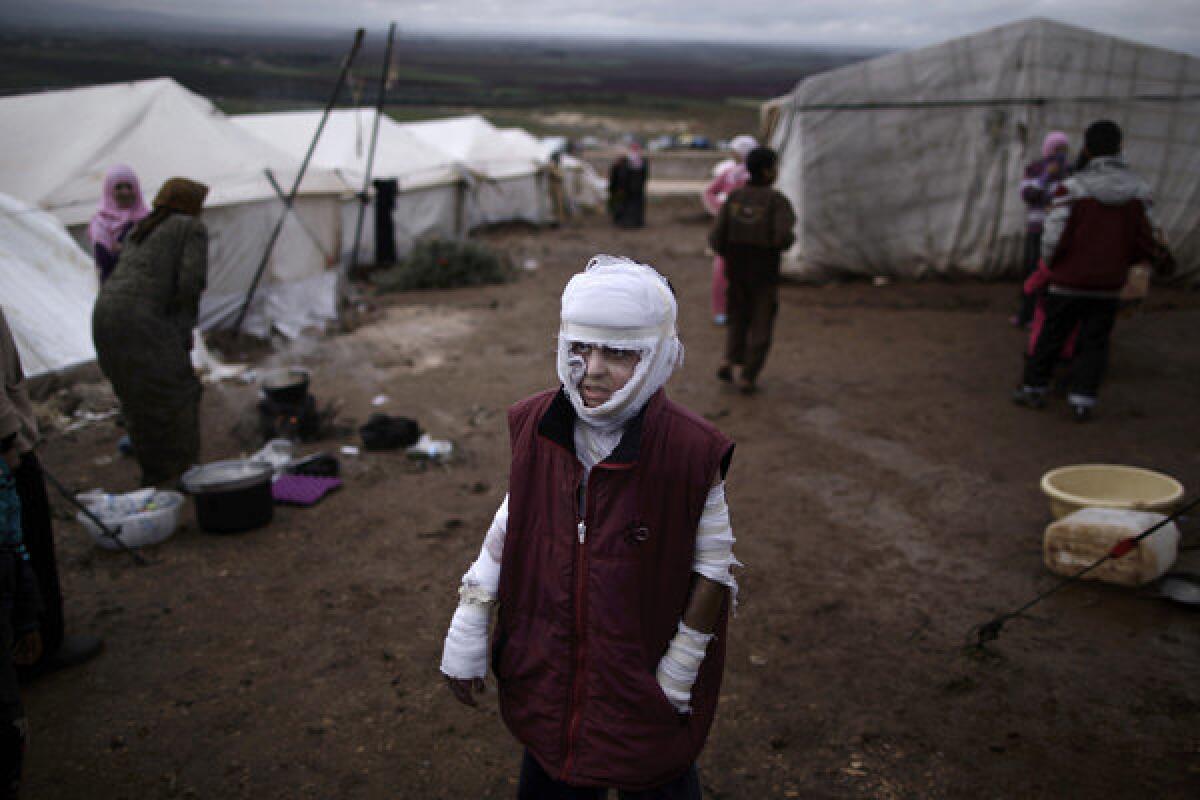Syria conflict turns ‘overtly sectarian,’ U.N. reports

- Share via
BEIRUT — The raging conflict in Syria, which began with street protests demanding political reform, has after almost two years of violence “become overtly sectarian in nature,” a United Nations panel reported Thursday.
The 10-page interim report, issued in Geneva, outlined a dire scenario on the ground in the war-ravaged nation and asserted that ethnic and religious differences are now stoking the escalating violence, drawing in militants and extremists from throughout the region.
“Entire communities are at risk of being forced out of the country, or of being killed inside the country,” reported the U.N.-impaneled Commission of Inquiry on Syria, in its latest update.
The fighting has sliced through Syria’s complex fabric of ethnic and religious groups, shattering the peace between communities that have long lived alongside one another.
The armed rebels seeking to oust the government of President Bashar Assad are mostly members of the majority Sunni Muslim community. Assad and much of the nation’s military and political leadership are secular adherents of the minority Alawite sect, an offshoot of Shiite Islam.
The more than 40-year rule of the Assad family has featured tolerance of religious practices but fierce repression of political opposition, be it religious or secular in nature.
Syria also has significant populations of Christians, Kurds, Shiites, Druse, Turkmen and other groups. As the threat has risen, some have formed “popular committees” to protect their districts from rebel incursions, the report noted. Other factions have sought alliances with the Sunni-led rebels.
The report describes instances of pro-government forces attacking Sunni civilians, while rebels regularly target Alawites and other minority communities viewed as pro-Assad.
An opposition fighter cited in the report recounted how captured Sunni soldiers faced imprisonment, while Alawite captives were summarily executed. Bombs have exploded near an important Shiite shrine outside Damascus and in Christian and Alawite districts of the capital. Sunni towns and neighborhoods have born the brunt of the relentless government bombardment.
The sectarian struggle has drawn in many foreign fighters, mostly Sunnis from the Arab world and North Africa. There have also been reports of Shiite militiamen from Lebanon and Iraq enlisting on the government side, while Shiite Iran, a major Assad ally, has provided Damascus with “intellectual and advisory support,” the report said.
The Christian community of the central city of Homs, once 80,000 strong, has been reduced to a few hundred after most fled the embattled city, the report said. In October, arsonists torched the historic St. Kevork Armenian Church in Aleppo on the same day that seven Armenians were among 10 Christians kidnapped on a bus traveling from Beirut to Aleppo. Their fate remains unknown, the report said.
Divided loyalties have marked Syria’s half a million-strong Palestinian community, mostly descendants of those who became refugees when Israel was created in 1948.
The densely populated Damascus suburb of Yarmouk, housing the largest concentration of Palestinians, has become a battleground in recent days. Armed rebels have been battling pro-government militiamen on the streets while the military reportedly responded with airstrikes and artillery. Most of Yarmouk’s more than 150,000 Palestinians are reported to have fled.
In the north, autonomy-minded Kurds have looked warily at the Arab-led insurgency and occasionally clashed with rebel forces.
“This is a war where no military victory is possible,” Paulo Sergio Pinheiro, the Brazilian human rights activist who heads the U.N. commission, told reporters. “With communities believing — not without cause — that they face an existential threat, the need for a negotiated settlement is more urgent than ever.”
ALSO:
23 die in attempted Mexican prison break
Latin American nations among the most upbeat, poll finds
U.N. appeals for $1.5 billion to help Syria’s residents and refugees
More to Read
Sign up for Essential California
The most important California stories and recommendations in your inbox every morning.
You may occasionally receive promotional content from the Los Angeles Times.










